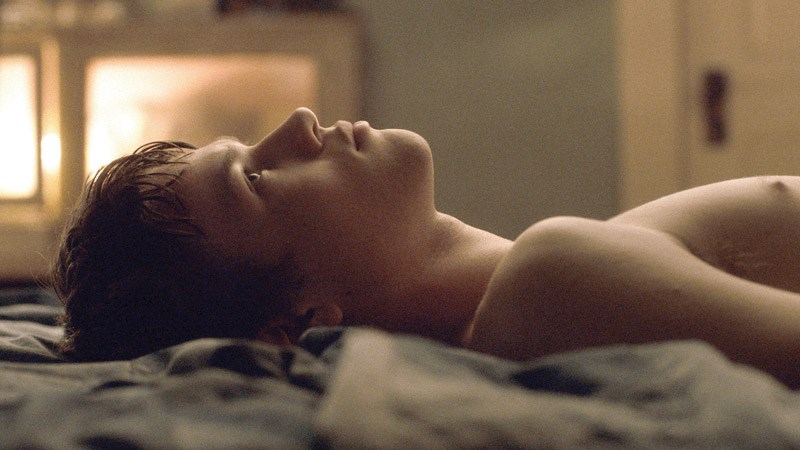Stephen Dunn and Connor Jessup are eating old-school Cheerios and chatting from Toronto via speakerphone about labels, a pivotal hate crime, and convincing Isabella Rossellini to play a talking hamster.
Dunn’s debut feature Closet Monster is the gut-wrenching, occasionally surrealist journey of Oscar Madly (Jessup) as he finds his place in the world and acknowledges his sexuality, burdened with the extra weight of having witnessed a terrible hate crime as a child.
The genesis of the story came from very dark place: a true hate crime committed against a gay teen in St. John’s, N.L.
“It really just grew from one image: a young man removing a hate-crime weapon from his stomach, as a moment of overcoming fear and the oppression in his life,” says the director. “I worked backwards from that image to establish the story of how we get here.”
Jessup, known for the sci-fi series Falling Skies as well as his pivotal role in the most recent American Crime season, came on board after finally getting around to reading the script.
“I was out of the country at the time, and I was very bad, I didn’t read it right away,” he admits. “I was taken with it mainly because I knew who Stephen was, and then when I read it, it didn’t take a lot of convincing.”
In fact, Dunn may always have had Jessup in mind – subconsciously or not – for the role of Oscar: “I wrote the entire script in Hart House at the University of Toronto, where a bunch of nerds and total geeks would go in every week over the summer to play this board game, and one of those nerds was Connor. When I was writing the role, I guess I was writing with him in mind.”
Then Dunn saw Jessup’s performance in Blackbird, about a teen accused of plotting a mass school shooting. “I knew we’d found him.”
(The nerdy pursuit that caught Dunn’s attention was the ancient game Go, Jessup says. “So that’s my advice to aspiring actors, take up Go!”)
Dunn shot in his hometown of St. John’s. Was it too close to home, literally?
“St. John’s is not jaded in the way that Toronto is. In Newfoundland people are so friendly and warm and excited to work, so there are a lot of benefits to shooting there,” he says. “But emotionally revisiting some of these spaces and stories … it was probably the most stressful period of my life. I had to overcome my personal struggles, my nervousness of telling the story.”
Oscar deals with a mother who abandons him and a manic, latently homophobic father. He finds asylum in the treehouse they built together, where he works with his friend Gemma (Sofia Banzhaf) on elaborate horror-genre creations and dreams of life as a makeup artist in New York City. Dunn employs these macabre touches and magic realism as a manifestation of Oscar’s tormented state: “Because the content of the film is from a darker and more tortured space, it lent itself to the horror genre.”
Is it any wonder that Oscar finds solace and wisdom in the company of his hamster, Buffy?
“The voice of Buffy was robotic originally,” says Dunn. “We were almost completely done. The humour was there but the maternal nature was not.” Dunn was re-watching Isabella Rossellini’s Green Porno series for Sundance, and in one episode she plays a hamster. “I thought that would be amazing! I pitched to it my producers, who had worked with her before. We had no money, but they loved the idea, sent her the script and she agreed right away.” What followed was a dream day of recording at Rossellini’s home in upstate New York, an “incredible experience” for Dunn.
Closet Monster has generated quite a bit of buzz as a queer film, though Oscar has to come to terms with more than just his sexuality. Dunn says he “embraces” the label, although he never set about making specifically a LGBTQ film. “Yeah, he’s queer and coming to terms with it, but it’s just one man’s personal coming-of-age narrative.” What’s really exciting, says Dunn, is the great variety of queer-centric films made for wider audiences. “For a long time queer film has been ghettoized… but it’s no longer categorized solely based on its queerness.”
Jessup has some dark, graphic moments in the film, not unlike his characters in American Crime (where he played a rape victim) and Blackbird. The actor says that while some of these issues are the result of playing teenagers dealing with coming-of-age tropes, the rest is “this chicken/egg thing. Like most people I’m attracted to interesting filmmakers and actors, and that comes about rarely enough that you jump at it.”
“I’m not attracted to edgy stuff specifically… I like to think that I’m a fairly happy guy.”
Jessup has been acting since he was 11. By age 15 he “wanted to be involved in something other than acting” and so he used his earnings from TV’s Saddle Club series to executive produce a film, Amy George. Wouldn’t most teens have spent their earnings on a Jet Ski?
“It coincided with my falling in love with movies… The only thing I’ve spent any real money on is film,” he says, before adding, “And food at restaurants because I’m too lazy to cook for myself!”
The 22-year-old has also directed a short film, Boy, and hopes to “beat Stephen” by directing his first feature before the end of next year.
Any plans to collaborate again? “Never, never again,” jokes Dunn, while Jessup says “It’s not up to the actor. Ask Stephen ... I can only hope.”



